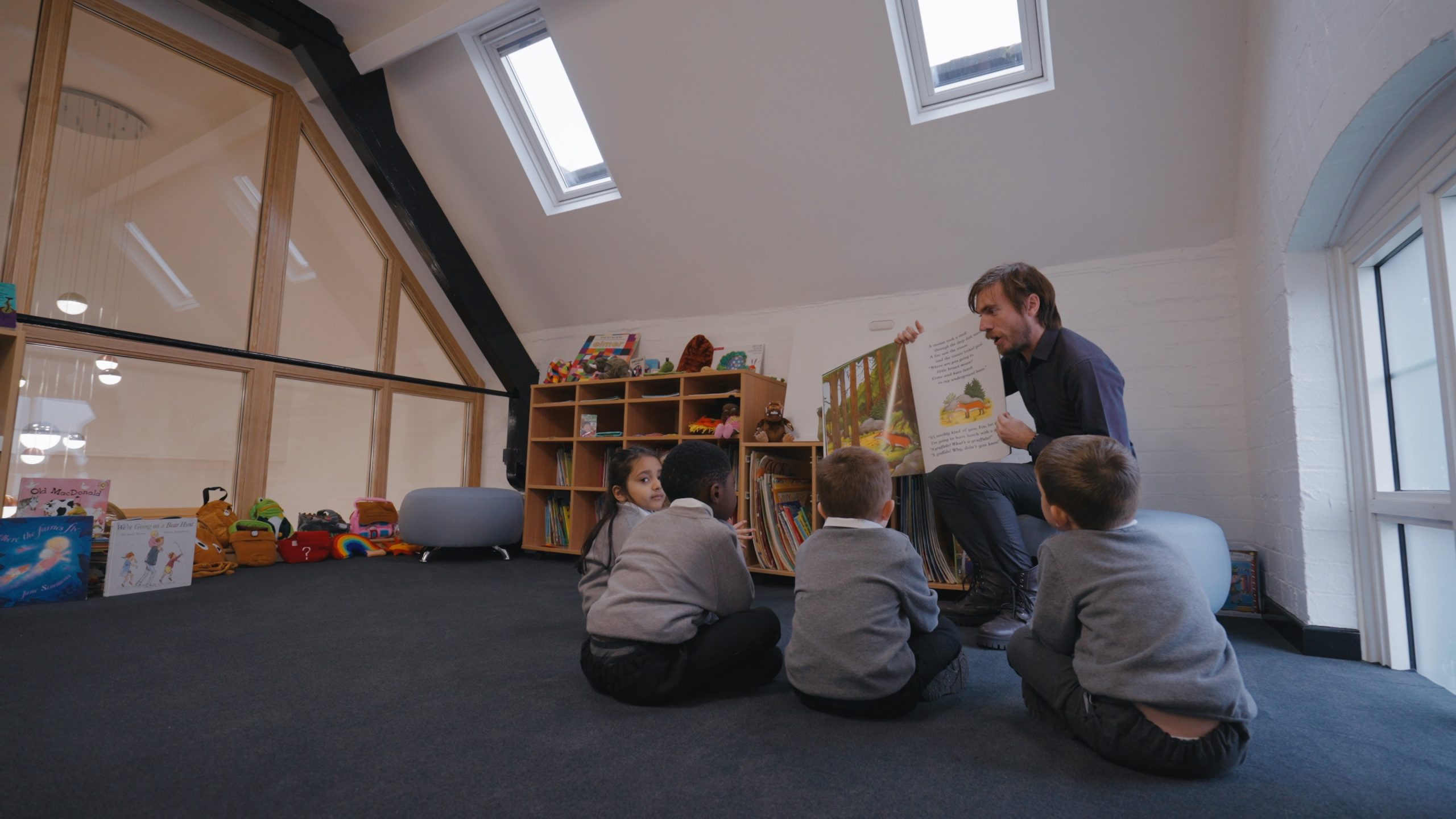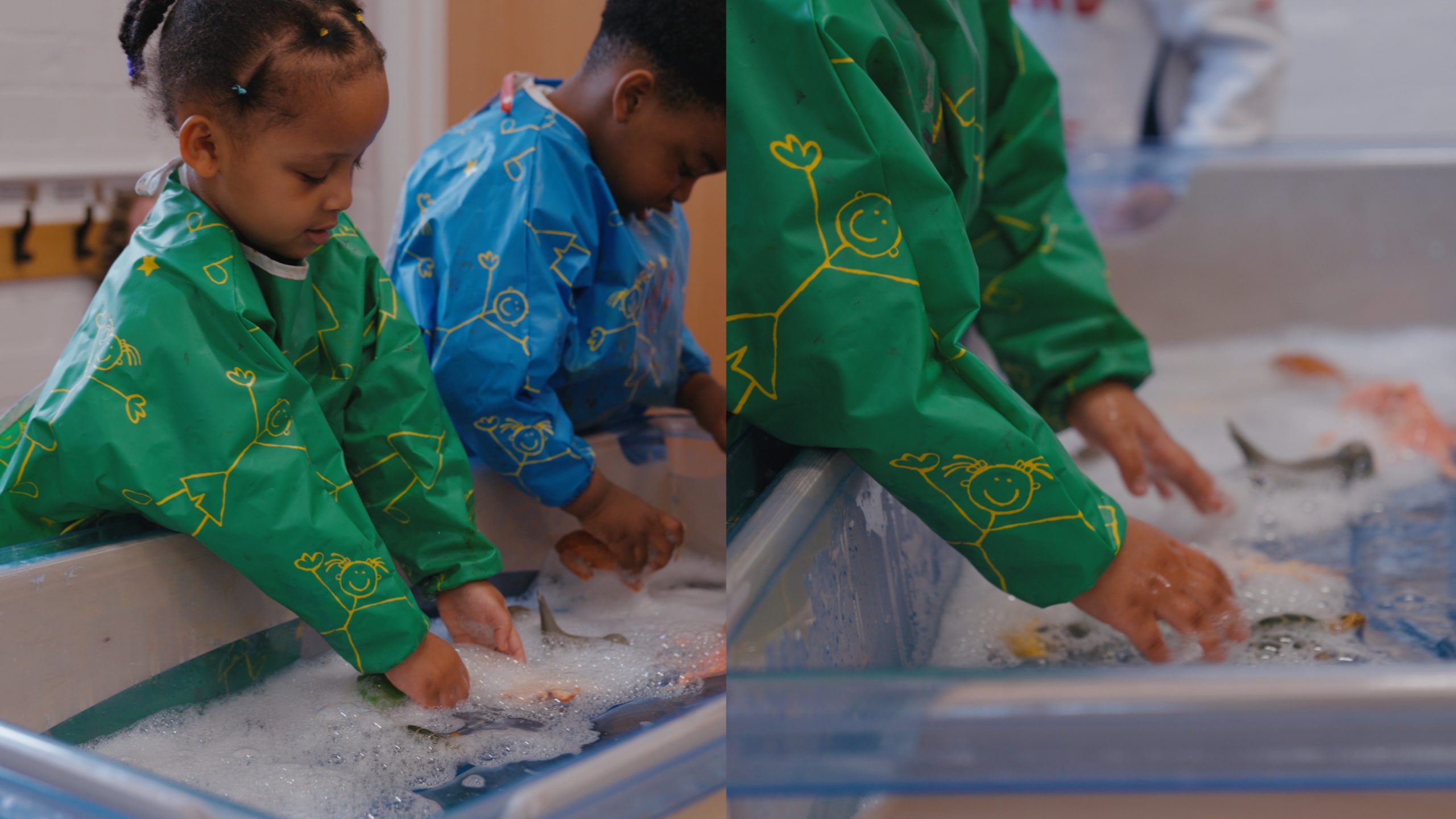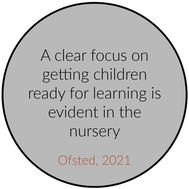SHINE in Early Years
SUCCEED – We will develop children’s independence through effectively utilising ECCERS and Development Matters outcomes. We will provide the skills, knowledge, understanding, values and resources needed in order to become successful and confident learners at the foundations of their lifelong learning journey. We will enhance learning through play but also support a strong foundation of phonics and reading, mathematics. We want to embed links to prime and specific curriculum areas, that will support them in their school readiness for Year 1.
HAPPY – We will provide a fun, stimulating learning environment with quality provisions to challenge and support children’s personal interests. Our bespoke Early Years curriculum brings opportunities to explore, practice, apply and analyse quality outcomes whilst being immersed in fundamental terminology and sentence structures. Pupils’ attitudes are praised and their contributions as individuals are valued.
INSPIRE – We will inspire children by providing a rich and varied curriculum that will capture the inquisitive imaginations of young learners in a way that promotes irresistible learning. Children will be motivated by learning opportunities that will take place both in and outdoors as well as through a bespoke curriculum that is enriched by adult interactions. Children will be stimulated through adult focused activities, their understanding of the world around them as well as their own imagination..
NURTURE – We will embed strong and caring relationships between key adults and children. We will nurture high levels of trust and respect between all members of the Early Years team and promote a safe space that values each other’s opinions and ideas. We will foster interactions between pupils and adults and build strong foundations upon quality – first learning opportunities, whilst celebrating and supporting diversity. We will support pupils to show their unique selves and to thrive in what they do.
EDUCATE – We will ensure that children’s own individual learning styles, interests and development is carefully observed and monitored in order to plan for the next steps of their learning journey. We strive to use effective modelling and expectations to motivate their individual needs. Communication and Language, Personal, Social and Emotional Development, Physical Development, Literacy, Mathematical, Understanding of the World and Expressive and Artistic Design skills knowledge and understanding will be taught explicitly and will be developed in order to guarantee the fundamental principles of the EYFS framework are securely embedded to secure a Good Level of Development.
We will create opportunities to allow all children to SHINE.


What is the Early Years Foundation Stage?

Every child deserves the best possible start in life and the support that enables them to fulfil their potential. Children develop quickly in the early years and a child’s experiences between birth and age five have a major impact on their future life chances. A secure, safe and happy childhood is important in its own right. Good parenting and high quality early learning together provide the foundation children need to make the most of their abilities and talents as they grow up.
The Early Years Foundation Stage
The Early Years Foundation Stage (EYFS) sets the standards that all early years providers must meet to ensure that children learn and develop well and are kept healthy and safe. It promotes teaching and learning to ensure children’s ‘school readiness’ and gives children the broad range of knowledge and skills that provide the right foundation for good future progress through school and life.
Intent
What do pupils need to know?
At Bantock we want pupils to become school ready and will develop children’s independence through their environment by providing the skills, knowledge, understanding, values and resources needed for becoming successful and confident learners at the foundations of their lifelong learning journey. Pupils will have opportunities to cultivate their confidence and ability to overcome challenges, friendships and ability to work with others, and understanding of rules and boundaries, in order to be resilient and friendly members of the school community. Pupils are provided with activities that develop their gross and fine motor physical skills as well as an understanding of their body, how to be healthy and keep safe. To close the vocabulary gap, pupils are constantly drenched in vocabulary and have good language structures modelled, and are then encouraged in a range of situations to develop confident communicators. Pupils should develop firm foundations for phonetical knowledge that they can use in reading and writing. They will gain the mathematical knowledge and skills needed for a basis in number, shape and measure. Pupils are exposed to a range of topics and experiences, both in and outdoors, and have access to a wide range of resources to develop their understanding of the world around them and their expressive art and design.
This is provided through a fun, stimulating learning environment with quality provisions to challenge and support children’s personal interests. The key adults in Early Years build relationships with pupils to support, provide language and challenge them to progress with these skills and knowledge.
Implementation
How is it structured for coverage?
The Early Years Curriculum is taught through discrete phonics, writing, reading and maths sessions, with a significant amount of time given for pupils to allow them to apply newly learnt skills, gain experiences and explore their learning preferences through their play. Planned adult led activities and resources for child led activities ensure that there is a coverage of each area of the EYFS, as well as broad range across the Development Matters age bands appropriate to the pupils in the class.
Planning is led by pupil needs based upon their progress and allowing provision to provide broad coverage of the Early Years expectations for child development with meaningful experiences. Half-termly topics allow for coverage of understanding of the world, to which discrete subjects are linked as closely as possible, although these can also be led by pupil interests.
Cultural Capital is gained through being given broad and balanced learning experiences in the enabling environments, and beyond with a range of visitors and visits.
How is it sequenced (logical progression) to acquire intended knowledge?
Development Matters stages and end of year EYFS Early Learning Goals are used as progression for planned activities identified by pupils on going attainment against these. As knowledge, skills and understanding are revisited throughout the year, these are sequenced to work through curriculum coverage, recap and build upon prior learning, and address gaps in pupil’s knowledge and skills. Through individual groupings, learning can be targeted to support this.
Is assessment helping pupils to use knowledge, check for understanding and inform teaching?
Assessment takes place all the time within the early years through both observations and experience of independent, child initiated learning as well as outcomes from formal teacher led activities, with a baseline being made at key starting points for pupils. Staff use their knowledge of childhood development to pitch learning appropriately, as well as supporting pupils to build on their knowledge and address misconceptions..
Which teaching materials support the intent of the planned subject?
Development Matters, Early Learning Goals, Medium Term Plans, Child Initiated Plans, Observations
Purpose and Aims
The EYFS seeks to provide:
- Quality and consistency in all early years settings, so that every child makes good progress and no child gets left behind;
- A secure foundation through learning and development opportunities which are planned around the needs and interests of each individual child and are assessed and reviewed regularly;
- Partnership working between practitioners and with parents and/or carers;
- Equality of opportunity and anti-discriminatory practice, ensuring that every child is included and supported.
- The EYFS specifies requirements for learning and development and for safeguarding children and promoting their welfare.

The learning and development requirements cover:
- The Seven Areas Of Learning And Development which must shape activities and experiences (educational programmes) for children in all early years settings which are described below;
- The Early Learning Goals that providers must help children work towards. The goals summarise the knowledge, skills and understanding that all young children should have gained by the end of the Reception year, ie. the year that they turn five years old; Learning Goals.
- Assessment Arrangements For Measuring Progress when and how practitioners must assess children’s achievements, and when and how they should discuss children’s progress with parents and/or carers.
- The Safeguarding and Welfare Requirements cover the steps that providers must take to keep children safe and promote their welfare.
- Overarching Principles of the EYFS
- Every child is a unique child, who is constantly learning and can be resilient, capable, confident and self-assured;
- Children learn to be strong and independent through positive relationships;
- Children learn and develop well in enabling environments, in which their experiences respond to their individual needs and there is a strong partnership between practitioners and parents and/or carers; and Children develop and learn in different ways and at different rates.
- The framework covers the education and care of all children in early years provision, including children with special educational needs and disabilities
The Seven Areas of Learning and Development:
- There are seven areas of learning and development that must shape educational programmes in early years settings. All areas of learning and development are important and inter-connected.
- Three areas are particularly crucial for igniting children’s curiosity and enthusiasm for learning, and for building their capacity to learn, form relationships and thrive.
These three areas, the prime areas, are:
- Communication and Language development involves giving children opportunities to experience a rich language environment; to develop their confidence and skills in expressing themselves; and to speak and listen in a range of situations.
- Physical Development involves providing opportunities for young children to be active and interactive; and to develop their co-ordination, control, and movement. Children must also be helped to understand the importance of physical activity, and to make healthy choices in relation to food.
- Personal, Social and Emotional Development involves helping children to develop a positive sense of themselves, and others; to form positive relationships and develop respect for others; to develop social skills and learn how to manage their feelings; to understand appropriate behaviour in groups; and to have confidence in their own abilities.
Providers must also support children in four specific areas, through which the three prime areas are strengthened and applied.
The specific areas are:
- Literacy involves encouraging children to link sounds and letters and to begin to read and write. Children must be given access to a wide range of reading materials including books, poems, and other written materials to ignite their interest.
- Mathematics involves providing children with opportunities to develop and improve their skills in counting, understanding and using numbers, calculating simple addition and subtraction problems; and to describe shapes, spaces, and measures.
- Understanding The World involves guiding children to make sense of their physical world and their community through opportunities to explore, observe and find out about people, places, technology and the environment
- Expressive Arts and Design involves enabling children to explore and play with a wide range of media and materials, as well as providing opportunities and encouragement for sharing their thoughts, ideas and feelings through a variety of activities in art, music, movement, dance, role-play, and design and technology.
- Assessment During EYFS Assessment plays an important part in helping parents, carers and practitioners to recognise children’s progress, understand their needs, and to plan activities and support. On-going assessment is an integral part of the learning and development process. It involves practitioners observing children to understand their level of achievement, interests and learning styles, and to then shape learning experiences for each child reflecting those observations. In their interactions with children, practitioners should respond to their own day-to-day observations about children’s progress, and observations that parents and carers share. To this end we make systematic observations and assessments of each child’s achievements, interests and learning styles. We then use these observations and assessments to identify learning priorities and plan relevant and motivating learning experiences for each child. Reception pupils also are given a statutory baseline assessment within the first 6 weeks of their start in school. More information about this for parents can be found here.

Impact
All pupils, including EAL, SEND and disadvantaged will leave Bantock Early Years ready to transition to Year 1 with the skills, knowledge and understanding to be school ready appropriate to their learning needs through the 7 areas of the curriculum.
They will have built secure knowledge in phonics to help them with reading along with other Early reading skills and develop vocabulary to help with their language and communication skills.
Early Years Policy
Bantock Early Years Offer
Baseline Assessment Information
Support if you are worried about your child’s language development.
Simple and fun activities to help children in the Early Years to learn and develop.
What To Expect When
We understand that parents can get concerned about what their child should be able to do by what age in Early Years, but children will pick up skills and learn new knowledge at different.
What To Expect When is a guide for what to expect at the different age groups of Early Years from 0-3 Years, 3-4 Years and 4-5 Years with links to more information to support learning at home.